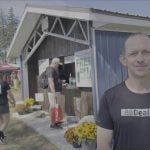While bulk grain handlers struggle with whether they can or want to segregate and market non-genetically modified crops, Ontario farmers and companies are cashing in on European demand.
Since 1996, a broker, a small grain company and a group of farmers have been carving out a market niche for non-GM food-grade soybeans.
It can be a lucrative business for farmers, said Gerry Fowler, president of Manna International Inc., a company that specializes in designing and auditing traceability systems to keep non-GM crops from being mixed with other types.
Read Also

Working groups established to address challenges in the containerized and bulk movement of commodities
CN is working with the pulse and special crops sector on resolving challenges in shipping those commodities.
Farmers have gained up to 50 cents per bushel for the non-GM soybeans, he said, which is a 10 percent improvement over regular cash prices.
Fowler, who is originally from Great Britain but now works in Sault Ste. Marie, Ont., has designed systems for major British retailers, including Marks and Spencer and Tesco, which allow them to trace where their supplies come from and how they are handled along the way.
A former organic soybean dealer, Fowler said he doesn’t take a position on whether GM crops present ethical or food safety dilemmas.
Rather, he told a recent Canada Grains Council conference, he focuses on meeting market realities and responding to consumer demands instead of ignoring, negating or insulting them.
The demand for tracing food supplies will remain, even if the “trigger” issue of GM crops fades, he said.
“(But) don’t expect any rapid changes,” in European cynicism about food safety, he added.
He argued that the GM issue is reshaping the food chain.
British consumers haven’t had to pay more for non-GM food, he said, explaining there are now fewer steps between the farmer and consumer because of traceability systems.
Buyers need to be more strategic and perform more due diligence on their suppliers, he added. They are looking for long-term relationships.
Since 1996, Manna has audited vessel loads of non-GM soybeans from the 400 to 500 farmers who contract with Snobelen Farms in Lucknow, Ont.
The beans are destined for soymilk and soyflour processors in Britain. Retailers also audit the processors, he said.
Snobelen Farms ships more than 40,000 tonnes of non-GM soybeans to Europe a year, Fowler said. Total Canadian production is around two million tonnes.
“It’s becoming a very interesting opportunity for (small and medium sized enterprises).”
Smaller companies are more willing to quickly make the changes needed for long-term traceability programs, he said, and Canadian companies are well placed to tap into the demand.
“We have an IP (identity preserved) culture,” he said, which begins in the certified seed system.
American exporters have tended to try to change customers’ attitudes rather than fill their demands, he said.
“We tend to have a more of a can-do attitude instead of, ‘Here’s what you’re going to get, hope you like it (attitude).’ “
Europeans tend to have a “guarded attitude to corporate America,” he said.














